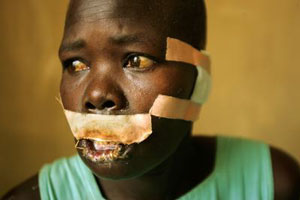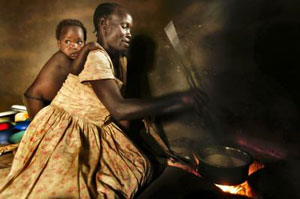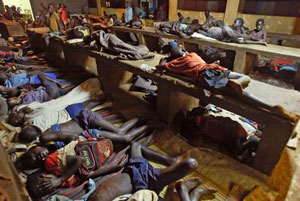 |
 | ||||||||||
Uganda
|
 |
|||||||||
|
While working on a six-part project on poverty in Africa, I met three young sisters in eastern Congo.
With tears streaming down their faces they told me a story of witnessing the murder of their father. They not only witnessed his death, but they witnessed rebels cutting off their father's hands and they were forced to eat them. The girls told me they were from northern Uganda, but had ended up in eastern Congo.
I was haunted by the girl's story. I didn't want to believe it. Was it possible people could be so cruel? I was also confused because I thought Uganda was a place of peace. I had never heard of any rebel activity in Uganda.
I learned about the "Lord's Resistance Army" or the LRA, a rebel movement that has been terrorizing northern Uganda for almost two decades. Children are kidnapped by the rebels and forced to become child soldiers, porters and sex slaves. Adults are at risk, as well. Once kidnapped, the captives often are put through a spiritual ritual or blessing. They are told that once they are blessed they are protected against bullets and can never escape.
The abductees are forced to commit atrocities such as burning, rape, murder and torture - including dismemberment and forced cannibalization. Children by the thousands walk into town centers at dusk, to evade abductors. They are known simply as "night commuters." They sleep on the ground - in schools, hospitals, bus stations, verandas and doorways. Fearful of sleeping in their own huts at night, they are seeking safety in numbers.
Outside the town centers, the Ugandan government has forced nearly 1.6 million people into Internally Displaced Person's Camps, where there is insufficient clean water, inadequate food supplies, and little security, employment or medical treatment. The IDPs are stuck between two fires: leaving the camps to grow food, search for firewood, or seek medical treatment, they risk being attacked by both the Ugandan military and the LRA.
I spent several days in one IDP camp in Gulu, where an old man told stories of his life as he weaved a floor mat. As I was leaving he thanked me for coming and said when journalists stop coming to a place, that place is dead. He said my visit breathed life into the camp.
At the same camp, I met a woman standing in line collecting water. I followed her home and spent much of the day photographing her cook and feed children inside her hut. It was a spare and impoverished place, yet somehow beautiful, with light filtering in from the doorway and small windows above the cooking area.
While in the camps, I knew the rebels could attack at any time. That was my reality for the brief time I spent documenting people's lives; it is their reality every day. I could always go home. They have no exit.
There is not a day that goes by now that I don't think about the people in northern Uganda. I think about the girls in Congo that brought me to this story. I think about the children who have never known a life of peace. Children who have never had the luxury of sleeping in the safety of their own huts.
I think about the displaced people living in the camps - invisible to the outside world. Displaced within their own country, they live with fewer rights then international refugees. I think about the NGO workers that are on the ground working every day. Mostly I think of the woman I photographed who had been mutilated by a young rebel. He cut her ears and lips off.
I asked her if she had hope for peace. She told me she didn't know if peace was possible, but she did know one thing - when she leaves the hospital she would return to the IDP camps to care for her children, and live the rest of her life in poverty.
© Francine Orr
Dispatches are brought to you by Canon. Send Canon a message of thanks. |
||||||||||
Back to July 2005 Contents
|
|



